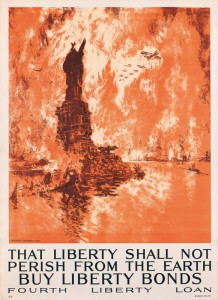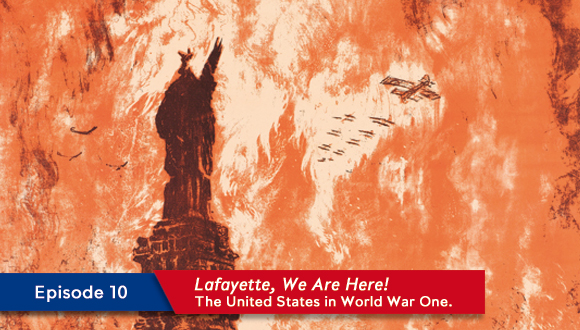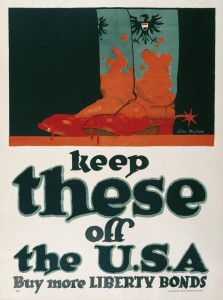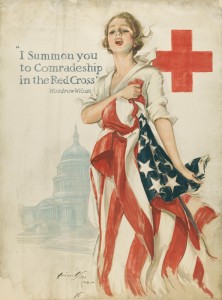
That Liberty Shall Not Perish From the Earth, poster by Joseph Pennell, 1918. © Paris, musée de l’Armée, dist. RMN-GP Émilie Cambier
America enters World War I
Shaping public opinion
On 14 April 1917, President Wilson established the Committee on Public Opinion and appointed George Creel as its chairman. George Edward Creel (1876-1953) was an investigative journalist who had invested himself in President Wilson’s re-election campaign in 1916. The United States Committee on Public Opinion acting as a government information agency had multiple missions: building the morale of all Americans, urging the public to subscribe to the Liberty Bonds, issuing rules of voluntary censorship to the domestic press, publicizing American war aims abroad, spurring military recruitment. To ensure full success, George Creel created an innovative propaganda apparatus that exercised significant influence in many areas.
For Liberty’s Sake
In 1917 and 1918, the United States issued war bonds order to raise money to finance the war. The borrowing effort was called the “Liberty Loan” and made operational through the sale of “Liberty Bonds”. The Emergency Loan Act enacted on 24 April 1917, authorizing issue of $ 5 billion in bonds at 3.5 % redeemable after 15 years. The “1st Liberty Bonds” campaign, started on 14 May 1917 and lasting one month, raised $2 billion. The Emergency Loan Act enacted on 1st October 1917, authorized issue of $ 3 billion in bonds at 3 %. The “2nd Liberty Bonds” campaign raised $ 3.8 billion. The Emergency Loan Act enacted on 5 April 1918, authorized issue of $ 3 billion in bonds at 4.5% and the Fourth Emergency Loan Act enacted on 28 September 1918, authorized issue of $ 6 billion in bonds at 4.25%.
William Gibbs MCAdoo (1863-1941), U.S. Secretary of Treasury, who had initiated the Emergency Loan Act, reacted to the sales problems by asking to the Committee on Public Information to launch an aggressive campaign to popularize the Liberty bonds. The so-called “Four Minutes Men” gave four minutes speeches on specific subjects, famous artists designed posters and celebrities, such as Charles Chaplin took part in bond rallies where buying a Liberty Bond was “the patriotic thing” to do.




Ajouter un commentaire